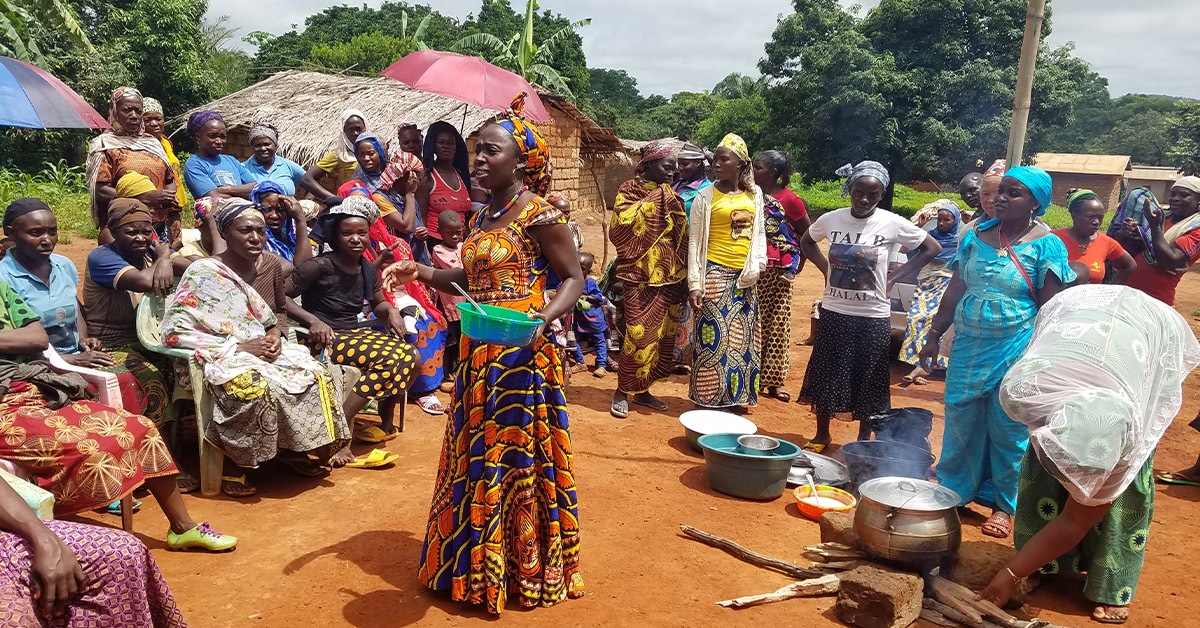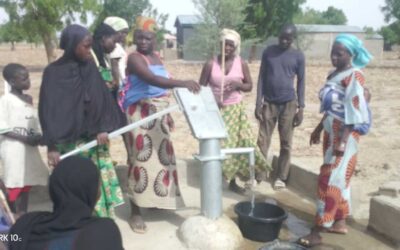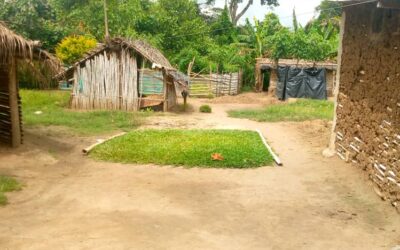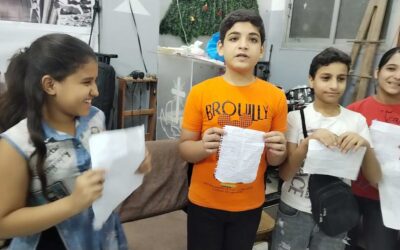Provision of Water Keeps Women & Children Safe
August 11, 2023
Africa | Bankim Village | Cameroon | Education | Food | Income | Sustainable Development | Water | Wellness

Transformational Community Development (TCD) continues in the Bankim cluster with malnutrition lessons in Tchim Village and clean water flowing from stand taps in Mape City.
Our work earlier identified malnutrition disasters affecting 32 families within Tchim Village. Urgent relief and malnutrition lessons were invaluable to save the lives of the affected children. The Wellness Committee identified poor nutrition as the main factor affecting these families. Adeline, a member of the Wellness Committee, commented, “the community has all it takes to make the children healthy but they are not aware.” She worked together with women in the community and taught them how to prepare a local protein-rich meal called “Gari” or “bushiri be soja.” The meal is made of corn flour, soybean (or groundnut), dry fish, and sugar. All the ingredients are all locally sourced from the community; they are cheap and available all year round. Everyone in the community has access to these ingredients but, little did they know, they can combine them to fight malnutrition, especially for children and the elderly. It is recommended for children to consume thrice a day. The 32 families received relief food items made up of rice, soya bean, soap, vegetable seeds, and cooking oil to take care of the malnourished children and the entire community was advised to improve their feeding habits in order to be healthy.
Water has been problematic in Mape City for several decades. Women and children bore the brunt without complaining because of cultural practices. Dirty water didn’t get the final word as they embraced Transformational Community Development (TCD) in late 2019. “As the mayor of Bankim Municipality and Champion, I could not allow this village to continue in their old habits with TCD lessons yielding discernible fruits elsewhere in my municipality.” Spurred by the urge for development, water is the primary necessity on which the community can improve. Our lessons created a Water Committee that worked diligently with the municipality and raised cash contributions while the community provided kind labor lodging and feeding for the field technicians. These efforts yielded fruits with the development of water infrastructure, composed of a 65 meter deep borehole, buried pipelines, a submersible pump run by grid energy, elevated tower hosting 10 meter cubed water storage facility, and 2 water carrying pints for the community–serving the over 2000 population.
It was all curiosity and anticipation to see the first drops of water from their borehole. The community cued up assisting the technicians, burying pipelines and electric cables in the ground. By the evening, water started gushing out of the deep bore well into the storage reservoirs. “We have suffered tremendously in this community because of water, especially in the dry season. Our children and women will rest,” declared Aishatu happily collecting water with the children.
Bongajum, a teacher, farmer and president of the Water Committee, was overjoyed with the first drops of water and declared, “Our school pupils, female children, and women are safe from constant harassment in the bushes while going to fetch water. To my family’s health, it will eliminate the burden of medical bills and help me to save for children’s education.” This is a unique opportunity to equip women and girls with new opportunities and increase the economic potentials of the community.
Initially, the community depended on far away springs in nearby bushes for water in the dry season and shallow open wells in the rainy season. In recent years, the village traditional council had recorded several cases of teenage pregnancies associated with children harassed along the bushes in search of water. This is now history! And it won’t stop here. The community envisages extension to needy areas of the community within a short period of time.
Our future goal is to train the caretaker committee to collect user fees and ensure proactive maintenance for sustainability. Meanwhile, lessons on menstrual hygiene management and the construction of ventilated improved pit (VIP) toilets are equally planned.
Transformational Community Development (TCD) Update

Water
Water infrastructure has been developed! Our future goal is to train the caretaker committee to collect user fees and ensure proactive maintenance for sustainability.

Wellness
The Wellness Committee, headed by John, identified malnutrition affecting over 32 families, most of which are refugees struggling for resilience within the community. TCD lessons focused on preparing a balanced diet using a common local meal called “bushiri be soja” (protein rich meal nutritious for children and the elderly). The 32 families received relief food items made up of rice, soybean, soap, vegetable seeds, and cooking oil. These refugee families need a long term sustainability project. It is rather unfortunate that one of the children died before our lesson and relief package. Meanwhile, lessons on menstrual hygiene management and the construction of ventilated improved pit (VIP) toilets are equally planned.

Income Generation
Multiple Income Generation projects are on-going with the Goat Loan Committee already a reality and vegetable gardeners following up their crops in the farms. The Women’s Empowerment Center has taken off with trainers and 17 children, aged 15-25 years, registered in the center. The Income Generation Committee is making an appeal for a rice hauler and is preparing a down payment of 10% cash. In the next quarter, our lesson will focus on evaluating the Goat Loan project and the Women’s Empowerment Center.
Thank you!
Written by: Eugene
GHNI Partner TCD Worker
Latest Stories from AFRICA
Deeper Well Brings Better Water
Thanks to GHNI, villagers now enjoy good water.
Clean Village Attracts New Residents
Neighboring villages notice the visible improvement of the clean and organized village and want to move there.
Welcoming a Change of Heart
Releasing pain and bitterness leads to reassurance and peace.



